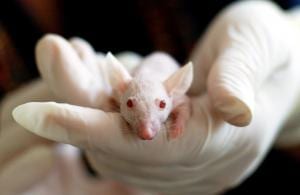
Many, if not most, people today accept that being deliberately cruel to animals is wrong. They understand there is something immoral in such activity, even if they cannot exactly state why it is immoral. Likewise, they even accept that there can be, and should be, some legal protections which prevent at least some kinds of cruelty towards animals.
On the other hand, most people also accept the notion that humanity is, in some way or another, superior to animals, and because of that superiority, they should have great flexibility in what they can do with animals. While they cringe when they see animals needlessly tortured, they are accustomed to animals being objectified and used as instruments for the sake of humanity. So long as there can be demonstrated some sort of benefit for humanity, animal exploitation is accepted. For example, it seems cruel to needlessly poison animals, but that is exactly what happens with many of them when they are given experimental drugs: not only are they poisoned to death, but they are often given toxins which give them slow, agonizing deaths, and this is done in order to test experimental medicines before trying them with human test subjects. Their deaths, their torture, might be seen as unfortunate.
It would seem that this acceptance of the instrumental use of animals, but a rejection of their outright torture when there is no value capable of being shown by such torture, comes out of a recognition that people who are innately cruel have a bad moral character and do wrong to follow through with such immoral desires. What is rejected is the direct, intentional goal of exhibiting such cruelty, not, however, the use of such pain for some other goal. They might be sorry to see some creature in pain, and desire it to be lessened if at all possible, but they will not intervene and put a stop to it in the way they would if they saw a sadist ruthlessly torturing an animal.
Is there any surprise consequentialism develops as a result of this? That is, on the one hand, we don’t like to see anything suffer, but on the other hand, we are wiling to accept such suffering, done by us, if it seems to benefit us in the end. But what is accepted in relation to animals, what is used to justify their abuse, can and often is used to explain away similar abuse to other humans. The use of unwitting human test subjects for experiments, like the Tuskegee Study on Syphilis, is the end result of this line of reasoning. Here, it was not mere animals, but fellow humans, who were turned into mere objects, with their subjective rights and desires ignored. As history also shows, such an attitude towards fellow humanity was not just had at Tuskegee, it’s rather a common one. Some group is declared by another to be inferior, so that the so-called superior group thinks they have the right and authority to objectify and do what they wish with what they consider inferior, especially if there is some benefit which can be shown as a result of such actions. Slavery, torture, medical experimentation, and the like have often been justified (and continue to be justified by some) by the combination of consequential thinking and the denigration of the other.
In this way, we can understand Kant. For him, like many others, animals are an inferior other, but Kant went further, trying to explain how and why he thought they could be objectified so that we owed them no moral considerations, as Robert Wennberg explained:
Kant, too, has his reasons for denying that we have duties to animals. His, perhaps, are the more famous. He argues that we do not have duties to animals because animals are not rational moral agents. That is, they are not beings capable of choosing between right and wrong, committing themselves to moral ideals, to life goals and projects, to religious outlooks, and so on. For Kant, only moral agents are to be respected as ends in themselves – that is, to be respected in such a way that their choices are not coercively overridden but honored and allowed to stand, to be allowed to choose the ends for which they are to live their lives, and to be fitting objects of duty.[1]
Kant’s theory of animals goes a long way in explaining why many humans likewise treat fellow humans poorly. They find a way to consider the other as no longer being a moral agent, and therefore, their exploitation is justified. Racists, for example, often see the other as sub-human, and so are not to be given the same moral rights as those who are “properly human.” Others, likewise, view babies, mentally handicapped individuals, or those in comas, or in some other incapacitated condition, as no longer being free moral agents, and so are capable of being instrumentalized. Though they might have the potential to attain moral agency, or they might have had it at one point in their lives, they currently lack it, meaning, they have no inherent rights of their own.
This is a problem with humanity in general. We find ways to excuse treatment of “the other” which otherwise go against our moral principles. Though, thankfully, as a society we currently have stretched ourselves into thinking less and less people are of the “other” to be treated as mere instruments of our will, we still find our collective will to power affecting the earth and its various creatures, continuing to engage practices which we have otherwise see as criminal when done to some other human person. This means we have not yet truly come to terms with our moral responsibility. If we do not do so, it is likely that whatever progress we have made will be lost, and we will find society once again finding ways to accept injustices which should never be deemed acceptable (such as torture or slavery).
Take, for example, genetic research. There is much value in it, but when it becomes used for genetic experimentation on animals, or for cloning, we begin to exploit them in ways which they have never been exploited before. In a way, as Andrew Linzey explained, it gives us new power over animals, in such a way that we totally dominate them:
No, it is not new that we are exploiting animals in new and cruel ways. But what is new is that we now have the absolute technological ability to reduce animals to things. Genetic engineering is one more step – yes – but also the ultimate step toward total human mastery over the animal world.[2]
Other forms of animal experimentation, while cruel, did not entirely take away their subjectivity; they could and would react as subjects (which, when considered, should have been enough to indicate they are moral agents, even if it could be proved that the range of their subjectivity is less than that of a human person). With genetic engineering, we totally undermine their subjectivity, because we working on animals at stages before such subjectivity have properly developed. They become the pure slave of our whim, and through genetic experimentation, we can wipe out or create entire species for our pleasure. What is more, we see what we create as property: we create and establish patents based upon our genetic research, which as Andrew Linzey also points out, turns them into pure property:
Genetic engineering represents the concretization of the absolute claim that animals belong to us and for us. We have always used animals, of course, either for food, fashion, or sport. It is not new that we are now using animals for farming, even in especially cruel ways. What is new is that we are not employing the technological means of absolutely subjugating the nature of animals so that they become totally and completely human property. [3]
It should not be difficult to see that this will not stop with non-human animals. Already, there is a question of who owns our genetic information. By accepting the premise that we can sell it off, that it can be owned by someone else, we have already begun the process which objectifies humanity and can and will turn us into property as well. What’s next? Outright slavery? With the massive income inequality getting worse and worse, and with it, more and more people having less means by which they can survive, it is not implausible to suggest that human history will repeat itself. The rich and affluent, as well as various corporate interests, can begin to buy out our genetic information; since we do not own it, our use of our own genetic code could then be seen as something “rented” to us. If we refuse to pay whatever it is they think they are owed, they will take the issue to the courts, and since they will be seen as the one with rights, it is frightening to consider what actions the courts might take to see we pay our dues.
For this reason, animal rights activists, with their concerns to protect the rights of animals as having moral claims on us, not only protect animals, but humanity from itself. For their rejection of the mere instrumental use of animals protect us from resisting the instrumental use of humanity. Of course, this should not be seen as the only reason why we should be concerned with animals and their well-being. It is, rather, the simplest and easiest case which can be made for those not yet attuned to moral arguments.
[1] Robert N. Wennberg, God, Humans and Animals (Grand Rapids, MI: William B. Eerdmans Publishing Company. 2003), 130.
[2] Andrew Linzey, Animal Gospel (Louisville, KY: Westminster John Knox Press, 1998), 101.
[3] Andrew Linzey, Animal Theology (Chicago: University of Illinois Press, 1994), 143.
Stay in touch! Like A Little Bit of Nothing on Facebook.
If you liked what you read, please consider sharing it with your friends and family!
















